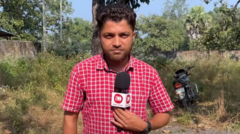Upon inspection, law enforcement officials recovered Chandrakar’s body buried beneath freshly poured concrete slabs covering the septic tank. His remains exhibited signs of severe trauma consistent with blunt-force injuries, igniting fears about the potential motives behind his death. The case has led to the arrests of three individuals, including two of Chandrakar's relatives, and heightened calls for accountability and a thorough investigation by media watchdogs and advocacy groups.
The local police's initial search on January 2 yielded no findings, but after reassessment, they uncovered the grave site on January 3. Following the revelation, the Press Council of India demanded a detailed report from Chhattisgarh's government regarding the circumstances surrounding Chandrakar’s death. The state’s chief minister expressed deep sorrow over the incident and announced the formation of a special investigation team to look into the case.
Media reports indicate that a cousin of Chandrakar is among those in custody, while a principal suspect, Suresh Chandrakar, the owner of the property, remains elusive. In light of this incident, local journalists have staged protests urging stringent action against those responsible for violence against the press.
This heinous act is part of a broader pattern of violence against reporters in India, particularly those who tackle sensitive issues such as corruption and environmental exploitation. Organizations like Reporters Without Borders categorize India as one of the most perilous environments worldwide for journalists, with an average of three to four killings each year related to their work.
Chandrakar’s grim fate mirrors that of other journalists, such as Subhash Kumar Mahto, who was fatally targeted for his investigative reporting on illegal mining operations. The ongoing attacks against journalists pose a significant challenge to press freedom and safety, fueling a disturbing trend that threatens democracy and accountability in India's media landscape.
The local police's initial search on January 2 yielded no findings, but after reassessment, they uncovered the grave site on January 3. Following the revelation, the Press Council of India demanded a detailed report from Chhattisgarh's government regarding the circumstances surrounding Chandrakar’s death. The state’s chief minister expressed deep sorrow over the incident and announced the formation of a special investigation team to look into the case.
Media reports indicate that a cousin of Chandrakar is among those in custody, while a principal suspect, Suresh Chandrakar, the owner of the property, remains elusive. In light of this incident, local journalists have staged protests urging stringent action against those responsible for violence against the press.
This heinous act is part of a broader pattern of violence against reporters in India, particularly those who tackle sensitive issues such as corruption and environmental exploitation. Organizations like Reporters Without Borders categorize India as one of the most perilous environments worldwide for journalists, with an average of three to four killings each year related to their work.
Chandrakar’s grim fate mirrors that of other journalists, such as Subhash Kumar Mahto, who was fatally targeted for his investigative reporting on illegal mining operations. The ongoing attacks against journalists pose a significant challenge to press freedom and safety, fueling a disturbing trend that threatens democracy and accountability in India's media landscape.






















